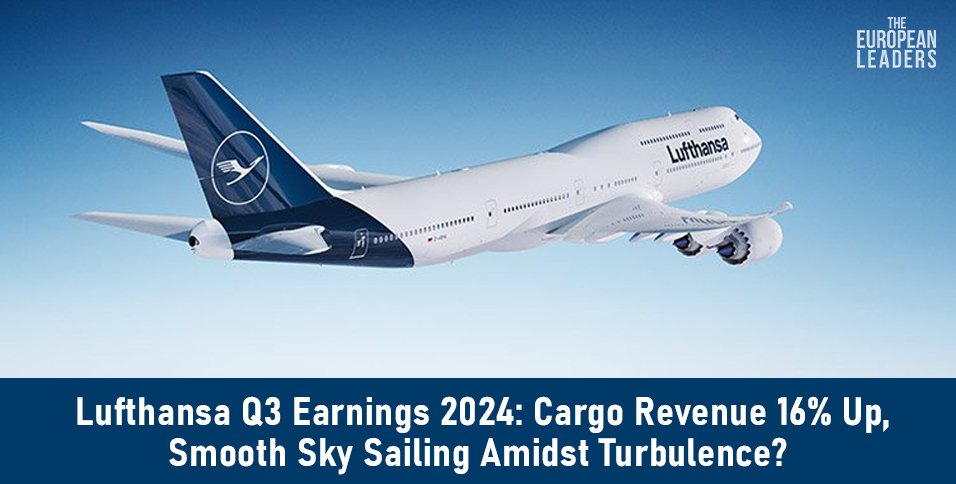The European Leaders
07 November 2024
Berlin – Lufthansa Q3 earnings 2024 have reached record-high revenues, driven largely by a substantial rise in cargo operations and robust summer travel demand. While the group achieved impressive top-line growth, it continues to face operational challenges that have impacted profitability.
But the question is, how did they manage to improve revenue in this turbulent industry?
Strong Cargo Performance Bolsters Revenue
Lufthansa’s cargo division posted a remarkable 16% increase in revenue year-over-year, reaching €782 million. This growth was fueled by increased demand, especially in the e-commerce segment from Asia, where market conditions have steadily improved.
Cargo volumes rose by 11% to 2.1 billion revenue cargo tonne kilometers, benefiting from strategic capacity adjustments to match demand spikes in the Asia-Pacific region.
The cargo load factor also improved by 3.4 percentage points to 59%, reflecting better capacity utilization and rising demand for Lufthansa’s air freight services.
Passenger Growth and Record Revenue Despite Challenges
Lufthansa Q3 earnings 2024 are its highest-ever quarterly revenue of €10.7 billion, marking a 5% increase from Q3 2023, with a significant portion attributed to heightened passenger numbers.
Over 40 million travelers flew with Lufthansa during the quarter, an increase of 6% from last year, raising the seat load factor to 87% for the period. August alone saw a record seat load factor of 88%, underscoring strong summer travel demand, especially for premium seating.
However, rising operational costs have put pressure on the group’s profits. Lufthansa reported an operating profit of €1.3 billion, down from €1.5 billion in Q3 2023, bringing its operating margin to 12.5% compared to 14.3% last year. This dip is attributed to higher personnel, maintenance, and operational costs, as well as ongoing challenges like labor strikes, which have disrupted operations and increased compensation payments for delays and cancellations.
Major Obstacles: Cost Pressures and Labor Disruptions
Despite the strong revenue, Lufthansa’s bottom line has faced setbacks.
- Labor strikes and higher labor costs in Germany continue to impact profitability, with collective bargaining agreements resulting in wage increases across cockpit, cabin, and ground staff. These labor issues alone have cost the group approximately €450 million this year, adding to the airline’s financial burden.
- Notably, the delays in newer, fuel-efficient aircraft like Boeing’s 777X models have forced Lufthansa to operate older models, leading to higher maintenance costs.
- Additionally, delivery delays for newer, fuel-efficient aircraft have forced Lufthansa to rely on older models, further increasing maintenance expenses. Industry-wide capacity growth has also led to a decline in average yields, with the Asia-Pacific region facing a notable 14% drop in passenger yields.
Future Outlook: Optimistic but Cautious
Looking ahead, Lufthansa Group has confirmed its full-year earnings forecast, expecting adjusted EBIT to range between €1.4 billion and €1.8 billion. This outlook is supported by high fourth-quarter bookings, especially for premium travel options, which the company hopes will sustain revenue momentum into the year’s end.
Nevertheless, the group remains cautious given ongoing operational challenges and competitive pressures, particularly in international routes.
Lufthansa is also advancing a turnaround program aimed at reducing costs and enhancing operational efficiency, with targeted savings of around €1.5 billion by 2026. This includes optimizing its route network and shifting short-haul traffic to lower-cost subsidiaries to balance its cost structure.
A Path Forward Through Turbulent Skies?
Lufthansa Q3 earnings 2024 signal the company’s resilience amid a challenging economic environment. Yet, with rising operational costs, labor disputes, and competitive market pressures, Lufthansa faces headwinds that may continue to impact its profitability.
As the airline sector braces for the uncertainties of 2024’s final quarter, Lufthansa’s ability to manage costs and enhance efficiency will be crucial in steering the group toward smoother skies ahead.








